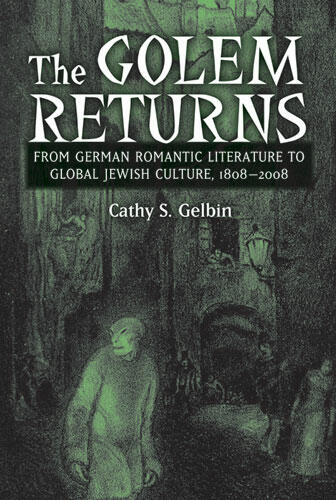The Golem Returns
From German Romantic Literature to Global Jewish Culture, 1808-2008
Exploring the role of the golem in the formation of modern Jewish culture
Description
The Hulk, Superman, the Terminator; they are all modern popular culture echoes of the golem, that mystical, artificial man of legend, a sort of friendly Jewish version of Frankenstein's monster. By focusing on the golem in key literary texts and films, The Golem Returns explores the role that popular culture has played in the formation of modern Jewish culture. Widely seen as an icon of authentically Jewish lore, the golem has inspired a broad range of writers across ethnic, cultural, and national affiliations in Europe, the United States, and Israel. Previous scholarly accounts of the golem have sought to distinguish between a supposedly authentic Jewish folktale tradition on the golem and its modern literary rewriting. In contrast, The Golem Returns contends that the popular culture theme of the golem as it is known today is the product of the complex cultural interaction between Jews and non-Jews since the early modern period, a process subverting stable and ethnically fixed notions of Jewish culture.
Tracing the popular culture constructions of the golem by non-Jewish and Jewish writers since the early 1800s, Cathy S. Gelbin argues that golem representations have come full circle and that popular culture, despite its subversion of clearly demarcated ethnic origins, has played an important role in the construction of modern Jewish culture. The Golem Returns will be of interest to scholars of German and Jewish Studies, as well as readers examining popular culture, film, and the illustrated novel.
Cathy S. Gelbin is Senior Lecturer in German Studies at the University of Manchester.
Jacket image: Hugo Steiner-Prag, illustration from Gustav Meyrink's The Golem (Leipzig, 1915). Staatsbibliothek zu Berlin—PK—Abteilung Historische Drucke 19 ZZ 6697.
Cathy S. Gelbin is Senior Lecturer in German Studies at the University of Manchester.
Reviews
"In tracing the Golem's literary career throughout two centuries, Gelbin has written a thought-provoking book not only on the Golem as character and symbol, but also on...the strict division between "high" and pop culture, the modern understanding and reception of Jewish culture, and national traditions versus diaspora and globalization." -- Susanne Kord, TLS-Times Literary Supplement
"...Gelbin not only elucidates, but also convincingly advocates for the vibrancy and productivity of the globalized golem and those who imagine him. The Golem Returns is well-conceived, well-structured, and well-written throughout." - Todd Herzog, Monatshefte
"In tracing the Golem's literary career throughout two centuries, Gelbin has written a thought-provoking book not only on the Golem as character and symbol, but also on...the strict division between "high" and pop culture, the modern understanding and reception of Jewish culture, and national traditions versus diaspora and globalization."
- Susanne Kord
—Susanne Kord, TLS-Times Literary Supplement
"Recommended for larger academic collections."
- Sheryl Stahl
—Association of Jewish Libraries, Sharyl Stahl
"Besides writing a lucid and engaging prose, Gelbin’s greatest achievement here is perhaps to follow the golem’s path...in a manner that enriches our knowledge of Jewish cultural history, critically complicates Jewish identity, and reminds the reader of how a people and a culture historically seen as so disconnected from other European traditions are in fact so richly interwoven with it."
- James Hodkinson
—James Hodkinson, Warwick University, Modern Language Review
"...Gelbin not only elucidates, but also convincingly advocates for the vibrancy and productivity of the globalized golem and those who imagine him. The Golem Returns is well-conceived, well-structured, and well-written throughout."
- Todd Herzog
—Todd Herzog, Monatshefte
"Until a 2006 episode of TV’s 'The Simpsons,' where Bart Simpson stole a golem from Krusty the Clown, Meyrink’s was probably the most famous adaptation of the ancient Jewish legend in which a man of clay is brought to life by magic as a 'sort of friendly Jewish Frankenstein,' as Germanist Cathy Gelbin stated in 'The Golem Returns.'"
- Benjamin Ivry
--The Forward

